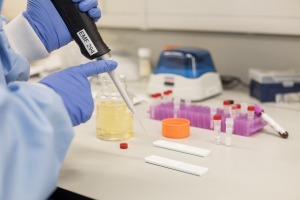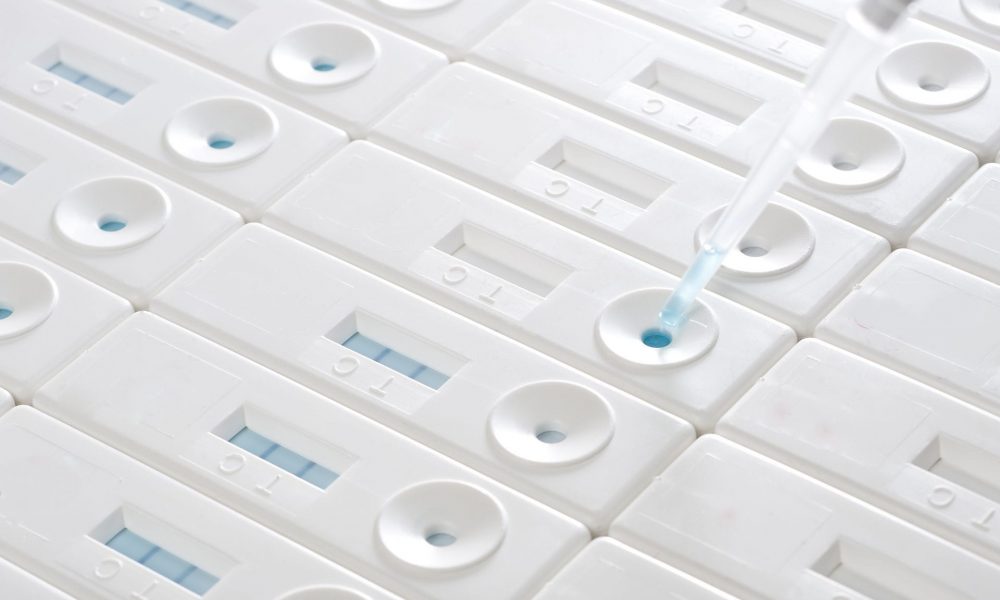The COVID-19 outbreak has resulted in a huge international response to begin developing simple rapid tests utilising lateral flow technology. Lateral flow technology is being applied to antibody tests, antigen tests and also RNA-based rapid tests. The benefits of the technology, its ease-of-use and ability to be used in decentralised settings, even the home, will be important in supporting the mitigation of the effects of the coronavirus.
However, a word of warning. It is critical for developers to consider scale-up from the outset.
Why consider scale-up early?
 Firstly, in order to reach the significant volumes of tests required, high throughput manufacture is required. It is key to have a manufacturing capability in place, and in fact more than one manufacturer in place to mitigate the effects of one plant needing to close due to a COVID-19 outbreak, as well as allowing the service of regional demand (Europe, North America) from a local manufacturer.
Firstly, in order to reach the significant volumes of tests required, high throughput manufacture is required. It is key to have a manufacturing capability in place, and in fact more than one manufacturer in place to mitigate the effects of one plant needing to close due to a COVID-19 outbreak, as well as allowing the service of regional demand (Europe, North America) from a local manufacturer.
Lateral flow manufacturing is currently niche and whilst efforts are being made to increase capacity, it is important to ensure your manufacturing is undertaken in controlled conditions and under a quality manufacturing system to ensure products are fit for purpose and the appropriate SOPs (Standard Operating Procedures) and quality control checks are being undertaken throughout the manufacturing process.
Small scale doesn’t always translate to large scale
Secondly, what works well in small-scale does not necessarily translate onto the large automated lateral flow manufacturing equipment. It is critical to get reagents onto large-scale equipment relatively early in the process, to ensure these issues are ironed-out at an early stage. Otherwise, it can be costly and time-consuming to rectify these issues at a later stage in the process.
Secure supply chain procurement early
 Thirdly, supply chain procurement is a major challenge due to lock-down in various parts of the world and the increase in demand for components. Getting the elements of the supply chain in place during development will allow immediate deployment of rapid tests once the product is authorised for use. It is not just securing supply of critical reagents used within the manufacture, it is also the “standard” components such as housings, nitrocellulose and backing card. There is a need to be sure of supply to prevent the requirement to undergo a product change if suddenly your current component supply dries up.
Thirdly, supply chain procurement is a major challenge due to lock-down in various parts of the world and the increase in demand for components. Getting the elements of the supply chain in place during development will allow immediate deployment of rapid tests once the product is authorised for use. It is not just securing supply of critical reagents used within the manufacture, it is also the “standard” components such as housings, nitrocellulose and backing card. There is a need to be sure of supply to prevent the requirement to undergo a product change if suddenly your current component supply dries up.
In conclusion, consider these factors early and build them into your project plan. Our expertise at Abingdon Health is in technical transfer to large-scale manufacture.
We offer high-throughput manufacture at a biosecure site near York, in the North of England. Our manufacturing site is ISO13485 and ISO9001 certified and is GMP-compliant. We have a well-established supply chain to support your development process. Please contact me below if you would like to discuss further.

